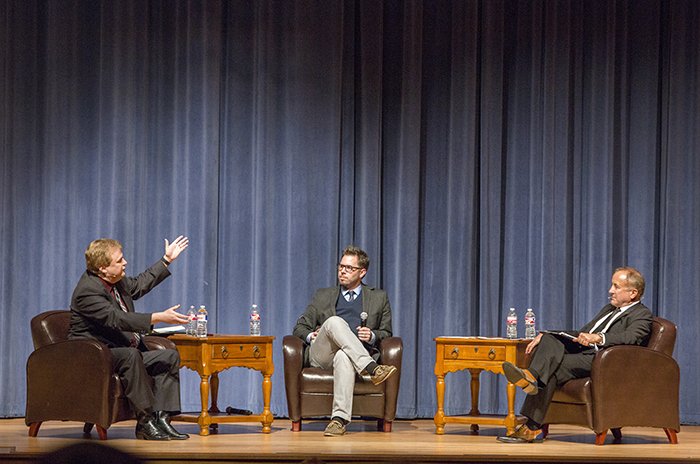Apologetics conference hosts Christian, atheist debate

Is faith reasonable? Is faith good? These questions were the center of a special “Christian/Atheist dialogue,” March 3, hosted by Southwestern Seminary in connection with the annual Stand Firm Apologetics Conference. The event featured Michael Shermer, founding publisher of Skeptic Magazine, and John Mark Reynolds, president of the Saint Constantine School in Houston.
Shermer and Reynolds each opened with prepared speeches before a Q&A time with each other. Although ultimately holding two distinctly different views and opinions on the topic of faith, both agreed that the evening resulted in a fruitful dialogue that allowed them to better understand each other.
In his opening statement, Shermer concluded that faith was neither good nor reasonable. He said that where the problem often arises in the topic of faith is its treatment as a legitimate and reliable method of knowing.
“Faith is not a reliable knowledge claim,” Shermer said. “You cannot hang onto that and convince me it is true. To convince me, you have to do something more than that—provide something measurable and empirical.”
It would seemingly be enough, he continued, to simply accept one’s unwavering beliefs and move on. The problem that arises, he said, is that people act on their personal beliefs and have great effect, oftentimes harmful, on the rest of the culture.
“Of course it’s not the end of the conversation for most believers,” Shermer said. “They want other people to believe it. Or if they are asked why they believe, they rarely say they have a good reason, and just that it makes them feel good.”
Reynolds followed, explaining that he agreed with some of Shermer’s concerns, including the importance of reason and the importance of free thought and free speech to education. But he ultimately said that Shermer had a bad epistemology (method of acquiring knowledge) and that he had not really addressed the topic of what faith is.
“Now let’s just both agree right away that believing something despite the evidence is a pretty good definition of being crazy,” Reynolds said. “You shouldn’t believe things despite the evidence.”
Reynolds later went on to address the common response he receives from atheists. He said people sometimes tell him that his experience of God is just in his mind, to which he answers, “What experience do I have that is not in my mind, fundamentally?”
Then responding to the topic of whether faith is good, Reynolds referenced what he said were many historical examples of the good results of people acting in faith, including the production of such things as art, medical systems, university systems, and republican forms of government. Faith prompts action, he concluded.
Reynolds further argued that without the existence of God, there would be no reason to make choices. “Faith isn’t believing what is unreasonable,” he said. “Faith is an experience that is self-authenticating at first, but then must be measured by reason and must act in the real world to be measured against standards of morality, standards of art and beauty, and other standards. So is faith good for society? Of course it is.”
The remainder of the event opened up a time for Reynolds and Shermer to debate with one another about the points they raised in their opening arguments, as well as a time of audience Q&A. In conclusion, both agreed that their conversation was productive and they urged others to continue engaging in constructive and civil conversations.
“My point is, let’s all just talk. Stop calling each other names,” Reynolds said. “I think philosophy is important. I think I should be guided by evidence. I think Christians should love science and practice it. I think we should follow the rules. I don’t think we should pretend we have evidence when we don’t have evidence. It’s time for us to lay down our arms and unite in the cause of reason.”
The Stand Firm conference continued on March 4 and featured Reynolds and Timothy McGrew, professor of philosophy at W. Michigan University, as plenary speakers. In addition, breakout sessions offered conference attendees workshops in more focused tracks in evangelism, cultural apologetics and advanced apologetics.



